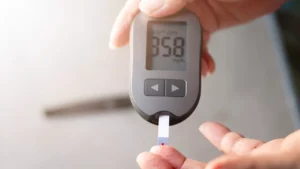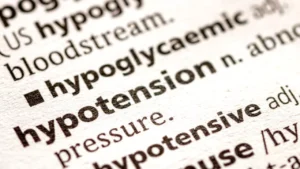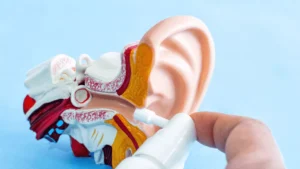Understanding the Causes of Dizziness: Beyond Vertigo
Dizziness, that unsettling feeling of lightheadedness or unsteadiness, can arise from a multitude of reasons beyond just vertigo. It’s important to delve into these diverse causes to better understand and treat this common symptom. In this comprehensive guide, we’ll start on a journey to explore various reasons behind dizziness, including dehydration, low blood sugar, and more.
Causes
1. Dehydration: When Your Body Needs More Hydration

Image Source: Canva
Dehydration happens when your body loses more fluids than it takes in, leading to an imbalance in electrolytes and reduced blood volume. This can happen due to various reasons, including inadequate fluid intake, excessive sweating during physical exercise or hot weather, or illnesses causing vomiting or diarrhea.
Symptoms:
- Thirstiness: Feeling parched and constantly reaching for water.
- Dry mouth: A sticky sensation in the mouth due to decreased saliva production.
- Dark-colored urine: Urine appears darker than usual, indicating concentrated waste due to insufficient water intake.
- Fatigue: Feeling tired and lacking energy, often accompanied by muscle weakness.
- Headaches: Dehydration can trigger headaches or worsen existing ones due to changes in blood flow to the brain.
2. Low Blood Sugar (Hypoglycemia): When Glucose Levels Dip Too Low

Image Source: Canva
When the amount of glucose (sugar) in your blood falls below normal ranges, you have hypoglycemia, also known as low blood sugar. This can occur when you fast for an extended period of time or skip meals, which results in insufficient glucose being supplied to the brain and other essential organs. When diabetics overdose on insulin or other diabetes treatments, removing too much glucose from their bloodstream, hypoglycemia can also result.
Symptoms:
- Shaking or trembling: Involuntary trembling or shaking of the hands, legs, or entire body.
- Sweating: Experiencing profuse sweating, especially without engaging in physical activity or exposure to heat.
- Confusion: Feeling disoriented or mentally foggy, with difficulty concentrating or processing information.
- Rapid heartbeat: Experiencing a pounding or racing heartbeat, often accompanied by palpitations.
- Hunger: Feeling extremely hungry, even shortly after eating, due to the body’s need for more glucose.
3. Orthostatic Hypotension: The Stand-Up Syndrome

Image Source: Canva
Orthostatic hypotension, which happens when you get up from a sitting or laying position, is an abrupt dip in blood pressure. This blood pressure reduction might result in insufficient blood flow to the brain, which can induce lightheadedness or dizziness, especially when standing up after lying down.
Symptoms:
- Feeling lightheaded or dizzy when standing up: Experiencing a sensation of spinning or unsteadiness upon rising from a seated or lying position.
- Blurred vision: Experiencing visual disturbances, such as blurred or dimmed vision, due to reduced blood flow to the eyes.
- Weakness: Feeling weak or lethargic, often accompanied by a lack of energy or motivation to engage in physical activities.
- Fainting (in severe cases): Losing consciousness temporarily due to a sudden drop in blood pressure, which can result in a loss of balance and falling.
4. Inner Ear Disorders: When Your Sense of Balance Gets Disturbed

Image Source: Canva
The vestibular diseases that affect the inner ears can cause disturbances in your body’s sense of balance and spatial orientation. In order to keep the brain in balance and equilibrium, the inner ear is essential for sensing changes in head position and movement.
Symptoms:
- Vertigo (spinning sensation): Feeling like the world is spinning around you or that you’re spinning in space, often accompanied by nausea or vomiting.
- Nausea and vomiting: Experiencing queasiness or an urge to vomit, especially when the vertigo is severe or prolonged.
- Difficulty with balance and coordination: Feeling unsteady on your feet or experiencing difficulty maintaining posture or walking in a straight line.
- Hearing loss or ringing in the ears (tinnitus): Experiencing changes in hearing sensitivity or perceiving ringing, buzzing, or other sounds in the ears.
5. Anxiety and Stress: When Your Mind Takes a Toll on Your Body

Image Source: Canva
Because anxiety and stress activate the body’s natural fight-or-flight reaction, they can cause physical symptoms such as dizziness. The body releases stress chemicals like adrenaline in response to perceived dangers or stressors, which can alter breathing patterns and blood pressure regulation, among other physiological functions.
Symptoms:
- Feeling lightheaded or faint: Experiencing a sensation of dizziness or wooziness, often accompanied by feelings of impending doom or panic.
- Rapid heartbeat: Experiencing a racing or pounding heartbeat, often described as palpitations or a fluttering sensation in the chest.
- Hyperventilation: Breathing rapidly and shallowly, often feeling like you can’t catch your breath or are suffocating.
- Muscle tension: Feeling tightness or stiffness in the muscles, particularly in the neck, shoulders, or jaw, due to increased stress levels.
- Difficulty concentrating: Experiencing mental fog or difficulty focusing on tasks, with racing thoughts or an inability to relax.
6. Medications: When Your Treatment Comes with Side Effects

Image Source: Canva
Dizziness is a side effect of some drugs, particularly after starting a new prescription or changing the dosage. Medication-induced vertigo can be brought on by a number of factors, such as blood pressure variations, neurotransmitter imbalances, or disruptions to vestibular function.
Symptoms:
- Dizziness or lightheadedness: Experiencing a sensation of unsteadiness or feeling like you might faint, particularly when standing up quickly or changing positions.
- Drowsiness: Feeling excessively sleepy or lethargic, with a strong urge to rest or nap throughout the day.
- Blurred vision: Experiencing difficulty focusing or seeing clearly, with images appearing fuzzy or out of focus.
- Difficulty concentrating: Experiencing mental fog or confusion, making it challenging to process information or perform cognitive tasks.
- Nausea: Experiencing queasiness or an upset stomach, often accompanied by a feeling of unease or discomfort.
Conclusion
Dizziness is a complex symptom with numerous of potential causes, ranging from small issues like dehydration to more significant medical conditions. By identifying these underlying issues, individuals can take proactive efforts to treat and manage their dizziness successfully. If you find yourself having persistent or repeated dizziness, it’s vital to connect with a healthcare professional for thorough diagnosis and guidance. With the correct technique, dizziness may frequently be effectively treated, allowing you to restore control and enhance your overall quality of life.
FAQ’s
What are the main causes of dizziness?
– Dizziness can be caused by a variety of factors, including dehydration, low blood sugar, orthostatic hypotension, inner ear disorders, anxiety and stress, and certain medications.
What is dehydration and how does it cause dizziness?
– Dehydration occurs when the body loses more fluids than it takes in, leading to an imbalance in electrolytes and reduced blood volume. This can cause dizziness, headaches, and fatigue.
What are the symptoms of low blood sugar (hypoglycemia)?
– Symptoms of hypoglycemia include shaking or trembling, sweating, confusion, rapid heartbeat, and hunger.
What is orthostatic hypotension and how does it cause dizziness?
– Orthostatic hypotension is a sudden drop in blood pressure when standing up from a seated or lying position, which can cause dizziness, blurred vision, and weakness.
What are the symptoms of inner ear disorders that cause dizziness?
– Symptoms of inner ear disorders include vertigo (spinning sensation), nausea and vomiting, difficulty with balance and coordination, and hearing loss or ringing in the ears.
How do anxiety and stress cause dizziness?
– Anxiety and stress can cause dizziness by activating the body’s fight-or-flight response, leading to rapid heartbeat, hyperventilation, and muscle tension.
What medications can cause dizziness as a side effect?
– Certain medications, such as blood pressure medications, antihistamines, and antidepressants, can cause dizziness as a side effect.
How can I prevent dizziness caused by dehydration?
– To prevent dizziness caused by dehydration, drink plenty of water throughout the day, especially in hot weather or during physical activity.
What are the symptoms of hyperventilation and how can I manage it?
– Symptoms of hyperventilation include rapid breathing, dizziness, and muscle tension. To manage hyperventilation, breathe slowly and deeply, and practice relaxation techniques such as meditation or yoga.
How can I manage dizziness caused by inner ear disorders?
– To manage dizziness caused by inner ear disorders, seek medical attention and follow your healthcare provider’s treatment plan, which may include vestibular rehabilitation therapy, medication, or surgery.
